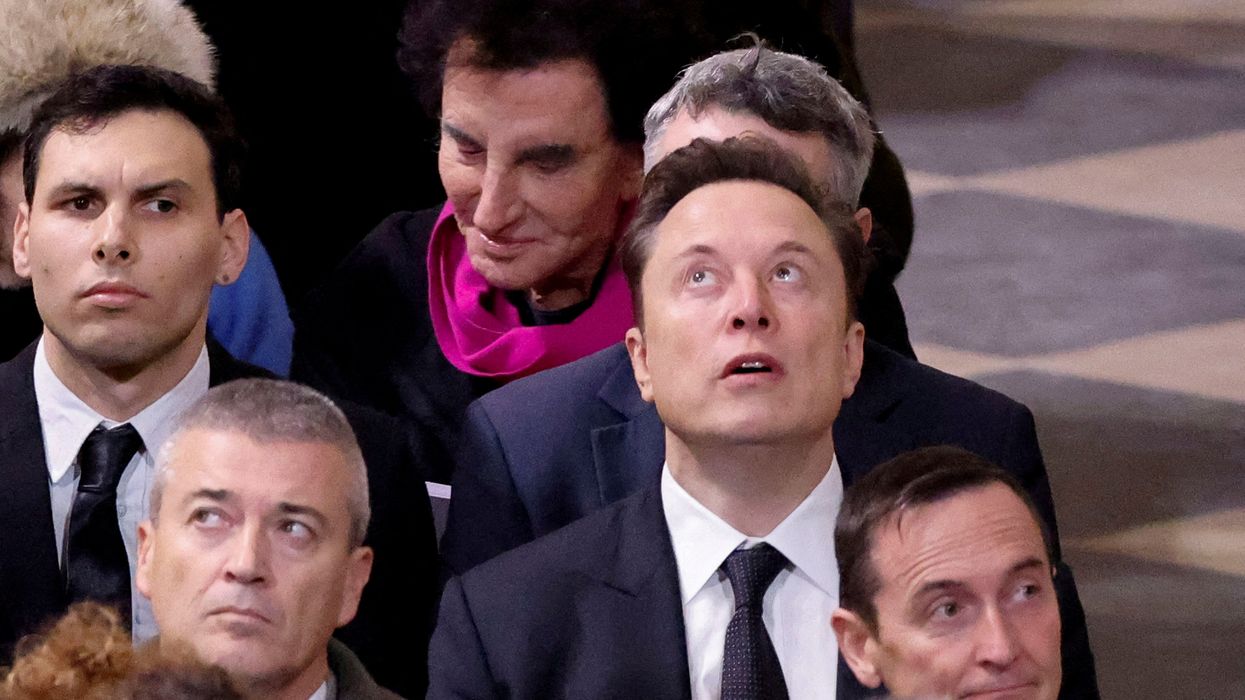Robert Reich: Why Musk is wrong about opening America to skilled workers from abroad

Tesla and SpaceX CEO Elon Musk looks up during a ceremony to mark the re-opening of the Notre-Dame de Paris Cathedral, following the 2019 fire, in Paris, France, December 7, 2024. LUDOVIC MARIN/Pool via REUTERS/File Photo

Tesla and SpaceX CEO Elon Musk looks up during a ceremony to mark the re-opening of the Notre-Dame de Paris Cathedral, following the 2019 fire, in Paris, France, December 7, 2024. LUDOVIC MARIN/Pool via REUTERS/File Photo
Robert Reich
December 29, 2024
When I was secretary of labor, America’s emerging Big Tech industry pushed to raise the cap on the number of skilled workers allowed into the United States under the H-1B visa program.
I resisted the pressure, telling business that if they wanted skilled workers so badly, they should train Americans for these jobs, including their own workers.
Apparently the same controversy has emerged among Trump advisers over whether and how many skilled foreign workers should be allowed into the United States on work visas.
On the one side are billionaire techies such as Elon Musk, the world’s richest person, who sank more than a quarter of a billion dollars into Trump’s reelection effort, and David Sachs, a venture capitalist who also poured a fortune into Trump’s campaign.
(Trump has rewarded Musk by picking him to be co-chair of the so-called “department of government efficiency” and rewarded Sachs by naming him czar for artificial intelligence and cryptocurrency policy.)
Both Musk and Sachs are from Big Tech and want more skilled workers from around the world. Both built or financed businesses that rely on the government’s H-1B visa program to hire skilled workers from abroad.
Trump’s immigration hard-liners don’t agree. Their goal is to radically restrict immigration, deport anyone who’s undocumented, and put up high tariffs to discourage imports from other nations (and their workers).
Which side is right?
On balance, it’s important to keep the pressure on American businesses to educate and train Americans for skilled jobs in the United States.
Allowing many more skilled workers into the United States reduces any incentives on American business to invest in the American workforce. Why do so when they can get talent from abroad?
Allowing many more skilled workers into the U.S. also reduces the bargaining power of skilled workers already in America — and thereby reduces any incentive operating on other Americans to gain the skills for such jobs.
And opening America to skilled workers also reduces the incentive on foreign nations to educate and nurture their own skilled workforces. Why should they, when their own skilled workers can easily migrate to America?
The major beneficiaries in the U.S. of opening the nation to skilled workers from abroad are CEOs and venture capitalists like Musk and Sachs, whose profits and wealth would be even higher if they could siphon off cheaper skilled workers from abroad.
Robert Reich is a professor of public policy at Berkeley and former secretary of labor. His writings can be found at https://robertreich.substack.com/
When I was secretary of labor, America’s emerging Big Tech industry pushed to raise the cap on the number of skilled workers allowed into the United States under the H-1B visa program.
I resisted the pressure, telling business that if they wanted skilled workers so badly, they should train Americans for these jobs, including their own workers.
Apparently the same controversy has emerged among Trump advisers over whether and how many skilled foreign workers should be allowed into the United States on work visas.
On the one side are billionaire techies such as Elon Musk, the world’s richest person, who sank more than a quarter of a billion dollars into Trump’s reelection effort, and David Sachs, a venture capitalist who also poured a fortune into Trump’s campaign.
(Trump has rewarded Musk by picking him to be co-chair of the so-called “department of government efficiency” and rewarded Sachs by naming him czar for artificial intelligence and cryptocurrency policy.)
Both Musk and Sachs are from Big Tech and want more skilled workers from around the world. Both built or financed businesses that rely on the government’s H-1B visa program to hire skilled workers from abroad.
Trump’s immigration hard-liners don’t agree. Their goal is to radically restrict immigration, deport anyone who’s undocumented, and put up high tariffs to discourage imports from other nations (and their workers).
Which side is right?
On balance, it’s important to keep the pressure on American businesses to educate and train Americans for skilled jobs in the United States.
Allowing many more skilled workers into the United States reduces any incentives on American business to invest in the American workforce. Why do so when they can get talent from abroad?
Allowing many more skilled workers into the U.S. also reduces the bargaining power of skilled workers already in America — and thereby reduces any incentive operating on other Americans to gain the skills for such jobs.
And opening America to skilled workers also reduces the incentive on foreign nations to educate and nurture their own skilled workforces. Why should they, when their own skilled workers can easily migrate to America?
The major beneficiaries in the U.S. of opening the nation to skilled workers from abroad are CEOs and venture capitalists like Musk and Sachs, whose profits and wealth would be even higher if they could siphon off cheaper skilled workers from abroad.
Robert Reich is a professor of public policy at Berkeley and former secretary of labor. His writings can be found at https://robertreich.substack.com/
No comments:
Post a Comment